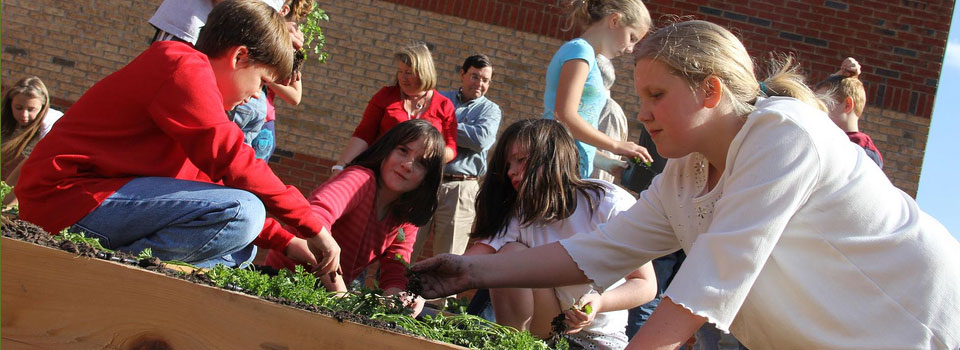The University of Georgia College of Agricultural and Environmental Sciences has launched an online resource for Georgia teachers looking to start or take full advantage of their school’s gardens.
Hundreds of schools in Georgia now have school gardens that teachers can use to help students connect classroom lessons and the natural world, said David Knauft, a professor of horticulture at UGA.
The UGA Extension School Garden Resource Center was launched in October, which was Farm to School Month. It offers teachers in kindergarten through eighth grade lesson plans that use school gardens to teach the curriculum prescribed in the Georgia Performance Standards.
Knauft collected and adapted the school garden lesson plans in order to make it easier for teachers to use their school gardens or to start new ones. During his research, he found that many teachers didn’t feel they had time to work gardening into their teaching day and didn’t have the support they needed to maintain the gardens.
“We conducted four focus groups with teachers, administrators and volunteers across Georgia, asking them about the value of the gardens and what we could do to help,” Knauft said. “They said that providing information to help establish and grow their gardens and how to work them into the existing curriculum, so that they could more easily use the gardens, would make a big difference.”
Knauft, who has taught horticulture at the UGA College of Agricultural and Environmental Sciences for more than three decades, first learned the importance of linking enrichment activities with state-mandated curriculum when he helped develop Project Focus. The elementary and middle school program gives college students the opportunity to teach curriculum-based science in local classrooms.
He collected and adapted the school garden lesson plans and other resources with the help of Alicia Holloway, a former agriculture teacher who is now working on the school garden project and hoping to start work on her master’s degree in horticulture at UGA.
“There’s a lot of pressure for teachers to improve test scores, so it can be hard to take time away from instruction to take a class outside,” Holloway said. “But if you can tie that time outside to the curriculum and use the school’s garden to teach them the standards that they need to learn, it starts to make sense.
“Hopefully, teachers will be able to go to this website, look at the lesson plan resources that are available and find one that works best for teaching the standards that they need to focus on, while introducing students to the natural world.”
In addition to the lesson plans, the School Garden Resource Center has a comprehensive guide on how to start and maintain a school garden and a listing of grants and funding sources for school and community gardens.
The resource center is a one-stop shop for resources from other state Extension agencies, the USDA and nonprofit organizations that promote gardening in schools.
Kaiser Permanente’s Partnership for a Healthier America funded part of the School Garden Resource Center and will help develop more standards-based lesson plans that can be used in Georgia’s school gardens.
For success stories of school gardens across Georgia, see the college’s environmental newsletter.


